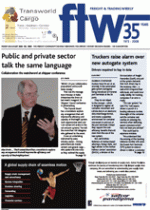"BRING US your collaborative
propositions and we will
listen closely."
That was the message
from Minister of Public
Enterprises Alec Erwin at
last week’s inaugural SA
Shippers’ Council conference
in Johannesburg
“The Transnet Board
has a mandate to explore
any arrangement that will
improve the efficiency and
capacity of the freight system.
Such opportunities exist and
I am certain will evolve in the
rail and port systems,” he told
the more than 100 delegates
who gathered for the event.
It was an undertaking
welcomed by every
industry sector – mining,
petrochemicals, metals,
cement and general cargo –
who spoke with one voice
as they outlined the supply to a particular despatch area
in the terminal, from where
the container will be shipped,”
Robinson added.
As a result, the incorrect
entry of the booking reference
number could see the
container loaded into the
wrong vessel – and a Los
Angeles-bound cargo ending
up in Tokyo, for instance.
This, according to
Robinson, could lead to DHCA
members having to accept
liability for this misrouting –
and to potential claims from
TPT, the truckers' customers
or other third parties for,
amongst other things, market
losses, deterioration of
perishable goods and the costs
of redirecting the container to
its correct destination.
But, said Kevin Martin,
MD of Freightliner, and vicechairman
of the DHCA, the
creation of this data never
has, and never should be, the
driver’s job or liability.
Currently, the association
members’ drivers merely
deliver the relevant paperwork
– the container transport
order (CTO) – which is
prepared by specialist third
parties. And, if incorrect
information is entered on the
CTO, the truckers are not
held liable.
“Our problem is that our
driver staff are employed for
their safe driving skills,” said
Martin, “and not as computer
clerks with advanced
administration skills.
“The skills level required for
completing a CTO is that of a
legal secretary. In other words,
extremely accurate – as any
mistakes could have serious
financial consequences.
“Drivers cannot be
expected to have this skills
level – hence the present
system where they only carry
the documents, but do not
author them.”
The easiest and most
cost-effective solution, Martin
added, would be for all clients
of the shipping lines to insist
that the releasing depot for
the empty container should
pre-advise Transnet as to
exactly which container has
been released against which
booking reference number.
“And this,” he said, “at
time of release, before the
shipper loads his cargo into
the box. The end result is that
no client’s goods should land
up going to the wrong vessel/
destination.”
Public and private sector talk the same language
22 Aug 2008 - by Joy Orlek
0 Comments
FTW - 22 Aug 08

22 Aug 2008
22 Aug 2008
22 Aug 2008
22 Aug 2008
22 Aug 2008
22 Aug 2008
22 Aug 2008
22 Aug 2008
22 Aug 2008
Border Beat
Poll
Featured Jobs
New
